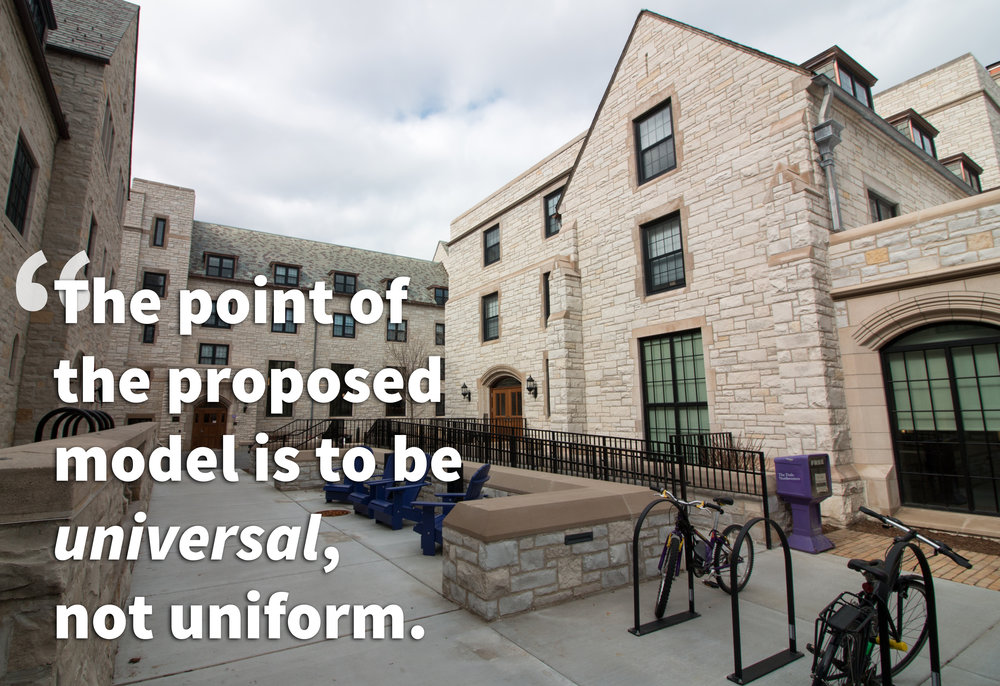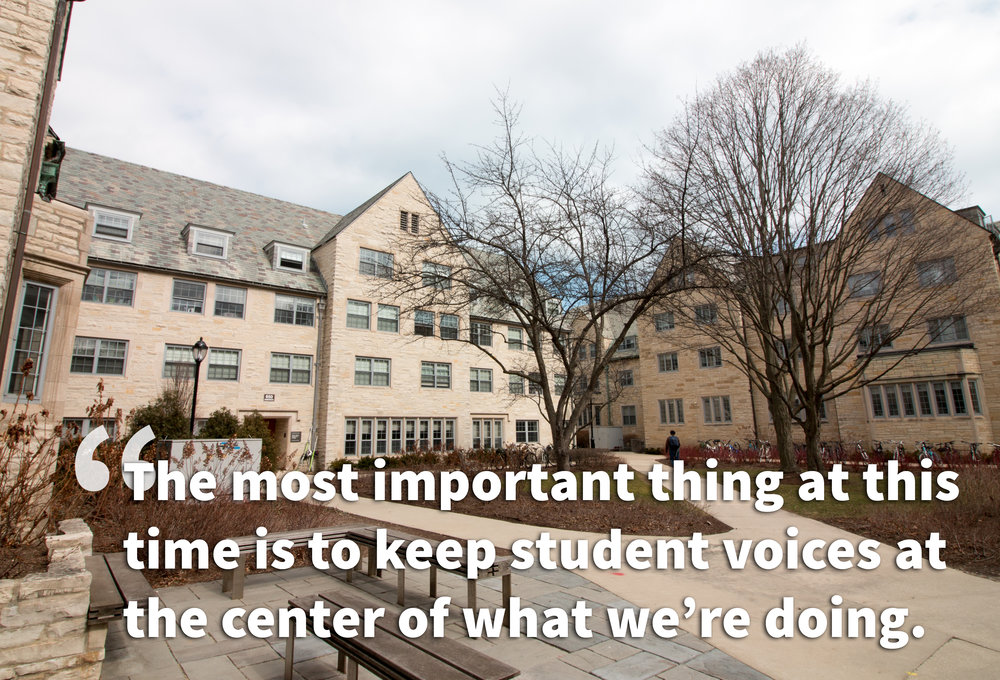 In January, Northwestern University released its much-anticipated Undergraduate Residential Experience Committee report, which proposed a framework for a universal undergraduate residential experience in the form of Neighborhoods all over campus, among other things.
In January, Northwestern University released its much-anticipated Undergraduate Residential Experience Committee report, which proposed a framework for a universal undergraduate residential experience in the form of Neighborhoods all over campus, among other things.
Soon after the release, the institutional initiative encapsulated in this 114-page document entered what it calls its “listening period.” At forums throughout Winter Quarter, students and other members of the Northwestern community could voice their questions, comments, and concerns about the proposed changes.
“It’s a very long document,” said Tim DeBold, the assistant director of Residential Academic Initiatives. “We can’t expect every student to read it the three or four times necessary to digest it all. So I think the forums were a very good opportunity for us to help clarify some things for students and make sure that everybody has a picture of what we’re proposing.” The forums have also had a sort of “multiplier effect,” said Director of Residential Academic Initiatives Brad Zakarin – if a misconception is cleared up for just one student at a forum, then they can go out and tell their friends, and word starts to spread.
 Representatives of the residential experience initiative have also been meeting with student groups like Associated Student Government, the Residential College Board, the Residence Hall Association, and more to hear their specific takes on the report and foster dialogue with the groups for whom the proposed changes hold the most weight.
Representatives of the residential experience initiative have also been meeting with student groups like Associated Student Government, the Residential College Board, the Residence Hall Association, and more to hear their specific takes on the report and foster dialogue with the groups for whom the proposed changes hold the most weight.
Although the last forum was in March, “the gates are not closing on student input,” said Zakarin – students can still participate in the process by voicing their questions and concerns through an online form. The administration will continue to hear from students throughout the process of developing and implementing the framework, whose ultimate goal is to create a universal residential experience that provides equal opportunities for all students living on campus. Next steps include assembling “working groups” with student representation that will work through some of the details of implementation of the proposed single residential model, like how the Neighborhoods will look and operate.
 The report is still in the deliberation stages, but the people involved in this initiative are not at a standstill in terms of plans for the residential experience on campus. They’re not just talking; they’re acting too. In other words, they’re piloting some of the ideas proposed in the report, such as a partnership with the Leadership Development and Community Engagement office that allows students in a certain residential area to build community by participating in service projects. Through this liaison, students in the South Area (Allison Hall, 1838 Chicago, Shepard, East and West Fairchild, Hobart, and Rogers House) travel together to the Gale School in South Evanston, where they form a relationship with the elementary school students.
The report is still in the deliberation stages, but the people involved in this initiative are not at a standstill in terms of plans for the residential experience on campus. They’re not just talking; they’re acting too. In other words, they’re piloting some of the ideas proposed in the report, such as a partnership with the Leadership Development and Community Engagement office that allows students in a certain residential area to build community by participating in service projects. Through this liaison, students in the South Area (Allison Hall, 1838 Chicago, Shepard, East and West Fairchild, Hobart, and Rogers House) travel together to the Gale School in South Evanston, where they form a relationship with the elementary school students.
 This kind of partnership fits perfectly with the goals of the UREC report – improving life on campus by facilitating events that bring the community together. “You’re killing two birds with one stone,” said Zakarin. “You’re doing service and residential community building at the same time, or you’re doing academic support, but you’re doing it in the Engagement Center of your Neighborhood with the people who live around there instead of schlepping up to Tech on a cold winter night.”
This kind of partnership fits perfectly with the goals of the UREC report – improving life on campus by facilitating events that bring the community together. “You’re killing two birds with one stone,” said Zakarin. “You’re doing service and residential community building at the same time, or you’re doing academic support, but you’re doing it in the Engagement Center of your Neighborhood with the people who live around there instead of schlepping up to Tech on a cold winter night.”
The goal of the new residential model is to create an improved and more equitable experience for all students living on campus, but Zakarin and DeBold stressed the idea that “it’s not going to be one size fits all, and it’s not all going to look the same.” In fact, they said the point of the proposed model is to be “universal, not uniform.” But the most important thing at this time is to “keep student voices at the center of what [they’re] doing.”
 If you missed the Feedback Forums last month and you’re still confused or curious about the proposed changes to the residential experience on campus, you can review the document here, and you can check out summaries by the Daily Northwestern and North by Northwestern.
If you missed the Feedback Forums last month and you’re still confused or curious about the proposed changes to the residential experience on campus, you can review the document here, and you can check out summaries by the Daily Northwestern and North by Northwestern.
Once you’ve brushed up on the facts about the report, send your feedback using this online form. We’re looking forward to hearing from you!
